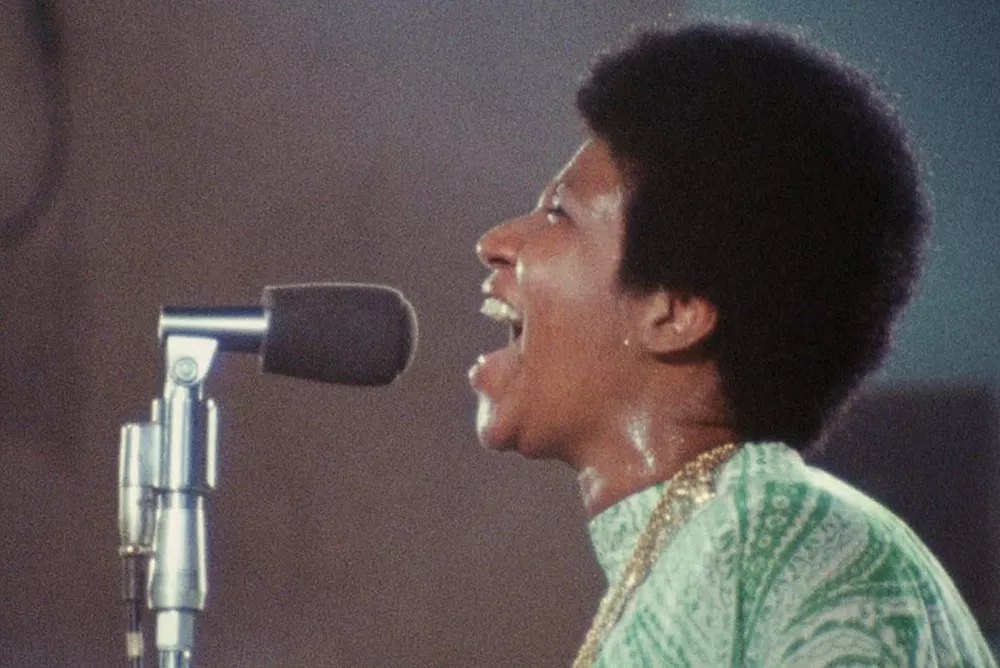"We want you to give in to the spirit," says Rev. James Cleveland, who acts as the showrunner in Amazing Grace, a resuscitated 1972 performance documentary showing Aretha Franklin recording the live gospel album of the same name. That spoken wish is not concerned merely with the spirit per se; he's asking the modest crowd ("can you sound like 20,000?") to ham it up, to go big for the sake of the camera, for television. Or maybe "ham," with its implications of fakery and ingratiation, isn't quite the right word. He's asking them to behave without reserve, to let go and feel openly, to make the most of their two-night show — but still with an eye to presentation.
Such are the intersecting demands of being a [well-meaning] public spiritual leader — a role in which the tasks of looking after people and show business are less at odds than blended together, in which the entire premise is to reach and move people, and in which building an audience and selling them records is understood to be doing them a service.
Here, even for the disabused, such spiritual advice is easy to take. There's little doubt as to the sincerity of the project here, even amid its contradictions, undertaken in a snug, oddly shaped Los Angeles church with dingy theater seating and wood veneers — one not even filled to capacity. Sydney Pollack's shooting (frankly, sloppy) enhances the no-frills feel; a more experienced documentarian would have laid out the architecture of the blue-accented space earlier, given a stronger sense of place and shot enough footage to avoid onscreen focus adjustments and hands passing over lenses. But then those are underseen facts of shooting a live event, and the attention his crew (there are several camerapersons seen working) fails to pay to depicting space and nailing technique — at least as it's conventionally understood — is lavished instead on the feeling of the crowd and the particular architecture of Franklin's face and performance, if that's the word.
Shot largely from the shoulders up after her swiftly gliding, all-business entrance, Franklin — without showboating — quickly overtakes the show's other hands and voices. In a performance both too large and too unadorned to register as an "act," Pollack's camera captures her range of moods and tones for what it is: an athletic achievement. Working her muscular, deftly made-up face from the start, she's the first among many onscreen to be aglow with sweat in the heat of her singing. Contorting her face and neck judiciously — she's pacing herself — the lines of her face illuminate bliss, ardor, pain, and (quite rarely) relief across a spread of gospel hymns and anthems. Her look is heavy, and one of love, as well as of considerable effort despite her range. Radiating authority and control over her body, her technique, her audience, and the room, it's clear nonetheless that between tracks she's steeling herself, that this is not a regular performance for her. When she drinks water between tracks, she does so deeply and with both hands.
It's hard to watch Franklin without focusing on her trademark squint, in which the lines out from her wincing eyes seem to connect with her dimples, encircling her face. Her expression seems to constantly slip between registers in a kind of cycle that can be hard to keep pace with, shifting as she sings. If most art is animated by some kind of mystery, by something it tries but doesn't quite manage to grapple with, it's in this film's case what's going on within her more than some mystery more traditionally divine.
Pollack's struggle to even shoot conveys some portion of that effort; it's not clear he knows what he's seeing, even if he can capture the energy of the turned-up crowd with a zoom. From the short-lived tear Franklin sheds when her father takes the podium to express his pride that she's returned to gospel music, it's clear she's grappling with much here herself in, after a long string of hits, returning to the music of her childhood — a time steeped just as much in music, in discipline and constant effort. It's hard to speak to where they may come from or what all is held back from the viewer's eyes, but maybe she's wincing to hold back tears.
Amazing Grace has screenings at 1:15 p.m., 4:15 p.m., 7:15 p.m., and 9:45 p.m. through May 2 at the Main Art Theatre, 118 N. Main St., Royal Oak; 248-542-5198; landmarktheatres.com. Tickets are $6.50.
Stay on top of Detroit news and views. Sign up for our weekly issue newsletter delivered each Wednesday.


